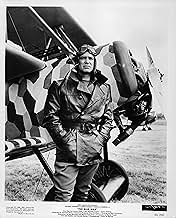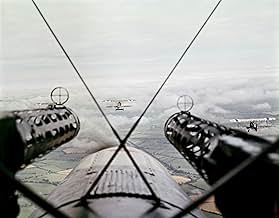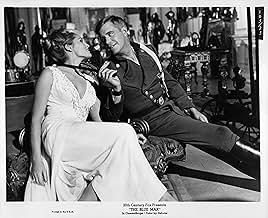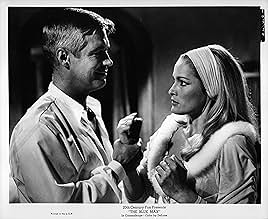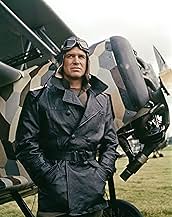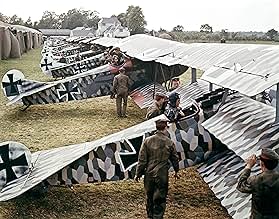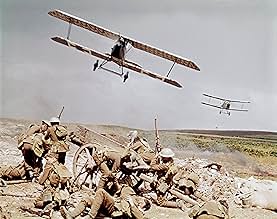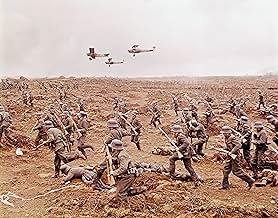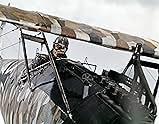Un giovane e ambizioso pilota tedesco nella Prima guerra mondiale, disprezzato per le sue umili origini, insegue ossessivamente la medaglia assegnata per 20 vittorie aeree.Un giovane e ambizioso pilota tedesco nella Prima guerra mondiale, disprezzato per le sue umili origini, insegue ossessivamente la medaglia assegnata per 20 vittorie aeree.Un giovane e ambizioso pilota tedesco nella Prima guerra mondiale, disprezzato per le sue umili origini, insegue ossessivamente la medaglia assegnata per 20 vittorie aeree.
- Regia
- Sceneggiatura
- Star
- Ha vinto 1 BAFTA Award
- 1 vittoria e 5 candidature totali
- Elfi Heidemann
- (as Loni Von Friedl)
- Feldmarschall von Lenndorf
- (as Friedrich Ledebur)
Recensioni in evidenza
This movie tells the story of Bruno Stachel, an ordinary infantry soldier who has been turned into a fighter pilot. His colleagues aren't happy with him, not only because he isn't an aristocrat like they are, but also because he's extremely ambitious. He will do anything to win him his country's most honored medal, the Blue Max. But to win it, he'll have to shoot down 20 enemy aircrafts, which will all have to be confirmed by his comrades, without getting killed himself. And while being hated by his fellow pilots, he's seen as the people's hero and perfect propaganda material by the general and as the ideal lust object by the general's wife...
"The Blue Max" shows very well how the pilots during WWI were almost always noblemen (I guess the most famous one of them all was Manfred Freiherr von Richthofen, better known as the Red Barron), who considered the concept of an honorable death at the hands of a "worthy" opponent still as one of the most important things during their fights. Even at the end of the war in 1918, while on the ground troops had been anonymously slaughtered by the thousands with machine guns and gas, they still considered chivalry as one of the highest goods.
Next to the historically correct situation of the story, I also admire the rest of the movie. I know, if you aren't interested in WWI, than this might not be the most spectacular movie you've ever seen, but even than the movie has plenty of good and interesting things to offer. The story on itself is nice, the acting is very good and the airplanes are magnificent to watch, on the ground as well as in the air. This is one of those movies that has stood the hands of time, but that is known by only a small audience, which is really a shame. Personally I'm a big fan of this movie and that's why I reward it with an 8/10. My advice: don't call "Top Gun" the ultimate fighter pilot movie before you've seen this one.
I saw this movie with my father in 1966. He always loved the bi-planes of World War I and they thrill me to this day.
The title, though central to the theme of the movie is really a misnomer to the enjoyment of this film. You actually get to see r-e-a-l aircraft in combat without the cartoon effects of CGI.
This is movie making in the school of the other Cinamascope greats: Somewhat weak on plot, but so absolutely cool in visual execution, that you overlook the script's lack of depth.
I'm not saying that this movie doesn't have a plot. It's a solid story with somewhat shallow character development. But in the end, the characters were secondary to a story of bravery, early air war history and tactics and the wearing away of chivalry in an era of a nation fighting for survival in the end of hours.
Acting was good, direction was fine and choreography using actual aircraft was among the last of it's kind.
I give this an 8 out of 10 for displaying concrete reality in an era of cartoon gimmicks.
The Blue Max is a rare old thing, a flying ace picture that not only is in colour, it's also rather good. Perhaps a touch too long {as Stachel's romantic character arc gets over fleshed}, but a ripper of a movie harking back to genre greats back in the 30s and 40s. The vintage planes recreated are majestic, and joyously the aerial sequences in the picture do them much credit, stunts and dogfights flow with almost operatic ease. The story is a good one, based on the best selling novel from Jack Hunter, it's tale of a man who's determination is admirable but ultimately it's his undoing, will winning The Blue Max really make him feel he belongs with the aristocratic crowd?, are the sacrifices he makes worth it?. The ending here is excellent, its point is made, and closes the film with a sort of uneasy incredulity, it takes a good few minutes for the final sequence to really hit home, but when it does you know you have just been sold a highly inventive story.
Technically the film scores high, the direction from John Guillermin is safe, tho if at times guilty of filler scenes, the score from Jerry Goldsmith is perfectly blood pumping, whilst Douglas Slocombe's cinematography pleases the eye. The acting is fine, George Peppard puts guts and honesty into the role of Stachel, Ursula Andress smolders and oozes sexuality as the cheating Countess Klugerman {one bedroom scene had this viewer particularly hot under the collar}, whilst James Mason {sadly underused} owns the film as chief string puller General Klugerman.
Open a bottle of wine on a Sunday afternoon and enjoy, 7.5/10.
The image is sharp and the colors are vivid. The sound is a bit conventional, but since the story is all-encompassing and well developed you will probably forget all technicalities and just sit through an excellent movie as I did.
The story deals with a simple German infantry soldier, stuck in the horror of the trench warfare, who dreams to fly and become an ace.
Well, he doesn't have to wait long and soon he's a flyer. he also becomes an ace.
Unfortunately, his modest social origins, keep him from the Sun, the Blue Max in fact. The Blue Max is the highest ranking medal given to pilots in WWI.
Knowing that, Stachel (Peppard) decides to fight all the odds and becomes totally ruthless and opportunistic.
Unluckily for him, two can play at the same game. The German Reich needs a hero, an example to play its cards right, in order to have more draftees to send to the front.
Stachel becomes such a hero, but to a price...
It is a crude and cruel depiction of the rise and fall of someone who came from nothing and through war, thought he could make it in society, only to find out that certain games are better left alone.
A very good morals and ethics lesson, from which many people could still learn something.
I can only suggest it. The rest is up to you.
Overall, Blue Max has moments of greatness and moments of boredom. A must see for war film fans, in any case.
Lo sapevi?
- QuizFox wasn't able to rent any of he surviving WWI planes still extant, so they built their own. The aircraft were later used in "Darling Lily" and "You Can't Win Them All."
- BlooperThe German award called the "Pour le Mérite" (a.k.a. the Blue Max) was awarded at the beginning of the war to pilots who shot down 8 enemy aircraft; that was later raised to 16. The requirement was never 20 as depicted here.
- Citazioni
Willi von Klugermann: By the way, Stachel... there's an impression around that... you care more about your unconfirmed kill than you do about Fabian's death.
[long pause]
Bruno Stachel: Perhaps it's force of habit. In the trenches, we couldn't even bury the dead; there were too many of them. I've never had the time... to discuss them over a glass of champagne.
- Versioni alternativeIt is believed that this film was at one time released in a 70 mm version (because of its six channel soundtrack), but this has never been confirmed.
- ConnessioniFeatured in The Amazing Howard Hughes (1977)
- Colonne sonoreDeutschlandlied
(uncredited)
Music by Joseph Haydn
Lyrics by August Heinrich Hoffman von Fallersleben
Played at Stachel's medal presentation
I più visti
- How long is The Blue Max?Powered by Alexa
Dettagli
Botteghino
- Budget
- 5.000.000 USD (previsto)
- Tempo di esecuzione2 ore 36 minuti
- Colore
- Mix di suoni
- Proporzioni
- 2.35 : 1
Contribuisci a questa pagina



